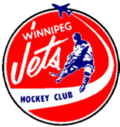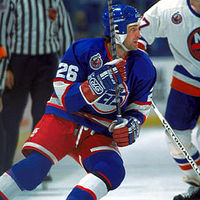Winnipeg Jets
| Winnipeg Jets | |
|---|---|
 |
|
| Founded | 1972 |
| History | Winnipeg Jets 1972–1979 (WHA) 1979–1996 (NHL) Phoenix Coyotes 1996–present (NHL) |
| Home arena | Winnipeg Arena |
| City | Winnipeg, Manitoba |
| Colours | Blue, red and white |
| Avco World Trophy | 1976, 1978, 1979 |
| Division championships | 1973, 1976, 1978 |
The Winnipeg Jets were a professional hockey team based in Winnipeg, Manitoba. They played in both the World Hockey Association (WHA) and the National Hockey League (NHL) from 1972 to 1996. Due to mounting financial troubles, in 1996 the franchise moved to Phoenix, Arizona and became the Phoenix Coyotes.
Contents |
Franchise history
The WHA Years (1972–1979)

The NHL had recently expanded to 16 teams, adding franchises in many hockey-hungry cities (only one in Canada), but also in Atlanta, Oakland and Los Angeles. The WHA brought major professional hockey to Ottawa, Quebec City, Winnipeg, Edmonton, and later Calgary. On December 27, 1971, Winnipeg was granted one of the founding franchises in the WHA, to Ben Hatskin, a local figure who made his wealth in cardboard shipping containers.[1] The team took their name from the Winnipeg Jets of the Western Canada Hockey League .[2]
The Jets' first signing was Norm Beaudin ("the Original Jet") and the teams first major signing was Bobby Hull. Hull's acquisition, partially financed by the rest of the WHA's teams, was widely seen as giving legitimacy to the WHA as a serious rival major league to the NHL.
The Jets were further noteworthy in hockey history for being the first North American club seriously to explore Europe as a source of hockey talent. Winnipeg's fortunes were bolstered by acquisitions such as Swedish forwards Anders Hedberg and Ulf Nilsson, who starred with Hull on the WHA's most famous and successful forward line (nicknamed "the Hot Line"), and defenceman Lars-Erik Sjoberg, who would serve as the team's captain and win accolades as the WHA's best defenceman. Behind these players and other European stars such as Willy Lindstrom, Kent Nilsson, Veli-Pekka Ketola, leavened by players such as Peter Sullivan, Norm Beaudin and goaltender Joe Daley, the Jets were the most successful team in the short-lived WHA. The team won the Avco World Trophy three times, including in the league's final season against Wayne Gretzky and the Edmonton Oilers. The Jets made the finals five of the WHA's seven seasons and were widely considered one of the best teams in hockey during the WHA era.
Another notable accomplishment was the Jets' 5–3 victory over the Soviet National team on January 5, 1978, making the Jets the first club team ever to defeat the Soviet elite squad.[3]
In the last season in the WHA, Kent Nilsson had 107 points, while Morris Lukowich had 65 goals, and Peter Sullivan had 46 goals and 86 points. The Jets made it to the Avco Cup and Gary Smith gave up the last goal in WHA history to Dave Semenko in a 7–3 Jets win.[4]

Career leaders (WHA)
- Games: Bobby Hull, 411
- Goals: Bobby Hull, 303
- Assists: Ulf Nilsson, 344
- Points: Bobby Hull, 638
- Penalty Minutes: Kim Clackson, 413
- Goaltending Wins: Joe Daley, 167
- Shutouts: Joe Daley, 12
The 1976, 1978 and 1979 Avco Cup winning Winnipeg Jets were inducted into the Manitoba Hockey Hall of Fame in the team category.
The NHL years (1979–1996)

By 1979, the vast majority of the WHA's teams had folded, but the Jets were still going strong and they were absorbed into the NHL. In doing so, they had to give up three of their top six scorers – the core of the last WHA champion – in a reclamation draft. They were also forced to draft 18th out of 21 teams. In the draft, they selected low-scoring defenseman Scott Campbell when such future standouts as Kent Nilsson, Terry Ruskowski and Rich Preston were still available. Campbell was out of the league within two years.
With a decimated roster, the Jets finished dead last in the league for the next two seasons, including a horrendous nine-win season in 1980–81 that still ranks as the worst in franchise history. This stands in marked contrast to the other 1979 Avco Cup finalist, the Oilers, who became one of the most powerful teams the game has ever seen during the 1980s.
The Jets' first two wretched NHL seasons did net them high draft picks, and in 1981 they drafted future Hall of Fame member Dale Hawerchuk. The team developed a solid core of players by the mid-1980s, with Hawerchuk, Thomas Steen, Paul MacLean, Dave Babych, Randy Carlyle, Laurie Boschman, Doug Smail, and David Ellett providing a strong nucleus.
The Jets were intermittently competitive for the rest of the 1980s and early 1990s, and had a very loyal following. However, regular-season success did not transfer over into the playoffs. This was because Winnipeg played in the same division as the Oilers and Calgary Flames – by some accounts, the two best teams in the league during the second half of the 1980s. Because of the way the playoffs were structured at the time, the Jets were all but assured of having to beat either the Oilers or the Flames (or both) to get to the Campbell Conference Finals. For example, in 1984–85, they finished with the fourth-best record in the entire league, with 96 points – both their best finishes as an NHL team. While they managed to dispatch the Flames in four games in the best-of-five division semi-final, they were swept by the eventual Stanley Cup champion Oilers in the division final. In fact, Winnipeg and Edmonton played each other in the playoffs six times between 1983 and 1990. The Oilers not only won every series, but held the Jets to only four total victories. Five of those times (1984, 1985, 1987, 1988, and 1990), the Oilers went on to win the Stanley Cup. 1987 was the last time that the Jets won a playoff series (defeating Calgary in the division semi-final before losing to Edmonton in the division final).
As the NHL expanded in the United States, operating costs and salaries grew rapidly; this development hit the league's Canadian teams particularly hard. As Winnipeg was the league's fourth-smallest market (eventually becoming the third-smallest market after the Quebec Nordiques moved to Denver in 1995), the Jets were unable to retain their best players. Various schemes were devised to save the team through a tremendous grassroots effort and government funds, but in the end the efforts were not enough. The Winnipeg Jets played their last-ever game on April 28, 1996, a home playoff loss to the Detroit Red Wings by a score of 4–1. Norm Maciver scored the last goal in Jets history.
During their history, the Jets retired two numbers: Bobby Hull's #9 and Thomas Steen's #25. Both numbers hang in Jobing.com Arena with the new Phoenix Coyotes franchise, in the Jets' old blue-red-white colour scheme adding Dale Hawerchuk's #10 in 2006. Another tradition that was retained when the franchise moved to Phoenix was the "white-out," in which fans wore all white to home playoff games.
Bobby Hull's #9 jersey was temporarily "un-retired" with the acquisition of his son Brett by the Coyotes. Brett wore his father's famous jersey until his own retirement on October 15, 2005, subsequent to which the number was re-retired. A number of former Jets remain active in the NHL; as of the 2009–10 season, these include Nikolai Khabibulin of the Edmonton Oilers, Teemu Selanne of the Anaheim Ducks, and Kris Draper of the Detroit Red Wings. Shane Doan, the current captain of the Coyotes, is the last Jet to remain with the Winnipeg-Phoenix franchise.

Season-by-season record
Note: GP = Games played, W = Wins, L = Losses, T = Ties, Pts = Points, GF = Goals scored for, GA = Goals scored against, PIM = Penalty minutes
WHA era
| Season | GP | W | L | T | Pts | GF | GA | PIM | Finish | Playoff record |
| 1972–73 | 78 | 43 | 31 | 4 | 90 | 285 | 249 | 757 | first, Western | Won Quarterfinals (Minnesota) Won Semifinals (Houston) Lost Finals (New England) |
| 1973–74 | 78 | 34 | 39 | 5 | 73 | 264 | 296 | 673 | fourth, Western | Lost Quarterfinals (Houston) |
| 1974–75 | 78 | 38 | 35 | 5 | 81 | 322 | 293 | 869 | third, Canadian | Did not qualify |
| 1975–76 | 81 | 52 | 27 | 2 | 106 | 345 | 254 | 940 | first, Canadian | Won Quarterfinals (Edmonton) Won Semifinals (Calgary) Won Finals (Houston) |
| 1976–77 | 80 | 46 | 32 | 2 | 94 | 366 | 291 | 991 | second, Western | Won Quarterfinals (San Diego) Won Semifinals (Houston) Lost Finals (Quebec) |
| 1977–78 | 80 | 50 | 28 | 2 | 102 | 381 | 270 | 988 | first, WHA | Won Quarterfinals (Birmingham) Earned Semifinals bye Won Finals (New England) |
| 1978–79 | 80 | 39 | 35 | 6 | 84 | 307 | 306 | 1342 | third, WHA | Won Semifinals (Quebec) Won Finals (Edmonton) |
| WHA totals | 555 | 302 | 227 | 26 | 630 | 2270 | 1958 | 6560 |
NHL era
| Season | GP | W | L | T | Pts | GF | GA | PIM | Finish | Playoff record |
| 1979–80 | 80 | 20 | 49 | 11 | 51 | 214 | 314 | 1251 | fifth, Smythe | Did not qualify |
| 1980–81 | 80 | 9 | 57 | 14 | 32 | 246 | 400 | 1191 | fifth, Smythe | Did not qualify |
| 1981–82 | 80 | 33 | 33 | 14 | 80 | 319 | 332 | 1314 | second, Norris | Lost Norris Semifinal (St. Louis) |
| 1982–83 | 80 | 33 | 39 | 8 | 74 | 311 | 333 | 1089 | fourth, Smythe | Lost Smythe Semifinal (Edmonton) |
| 1983–84 | 80 | 31 | 38 | 11 | 73 | 340 | 374 | 1579 | fourth, Smythe | Lost Smythe Semifinal (Edmonton) |
| 1984–85 | 80 | 43 | 27 | 10 | 96 | 358 | 332 | 1540 | second, Smythe | Won Smythe Semifinal (Calgary) Lost Smythe Final (Edmonton) |
| 1985–86 | 80 | 26 | 47 | 7 | 59 | 295 | 372 | 1774 | third, Smythe | Lost Smythe Semifinal (Calgary) |
| 1986–87 | 80 | 40 | 32 | 8 | 88 | 279 | 271 | 1537 | third, Smythe | Won Smythe Semifinal (Calgary) Lost Smythe Final (Edmonton) |
| 1987–88 | 80 | 33 | 36 | 11 | 77 | 292 | 310 | 2278 | third, Smythe | Lost Smythe Semifinal (Edmonton) |
| 1988–89 | 80 | 26 | 42 | 12 | 64 | 300 | 355 | 1843 | fifth, Smythe | Did not qualify |
| 1989–90 | 80 | 37 | 32 | 11 | 85 | 298 | 290 | 1639 | third, Smythe | Lost Smythe Semifinal (Edmonton) |
| 1990–91 | 80 | 26 | 43 | 11 | 63 | 260 | 288 | 1675 | fifth, Smythe | Did not qualify |
| 1991–92 | 80 | 33 | 32 | 15 | 81 | 251 | 244 | 1907 | fourth, Smythe | Lost Smythe Semifinal (Vancouver) |
| 1992–93 | 84 | 40 | 37 | 7 | 87 | 322 | 320 | 1851 | fourth, Smythe | Lost Smythe Semifinal (Vancouver) |
| 1993–94 | 84 | 24 | 51 | 9 | 57 | 245 | 344 | 2143 | sixth, Central | Did not qualify |
| 1994–951 | 48 | 16 | 25 | 7 | 39 | 157 | 177 | 1141 | sixth, Central | Did not qualify |
| 1995–96 | 82 | 36 | 40 | 6 | 78 | 275 | 291 | 1622 | fifth, Central | Lost Conference Quarterfinal (Detroit) |
| NHL totals | 1338 | 506 | 660 | 172 | 1184 | 4762 | 5347 | 27374 | ||
| Grand total | 1893 | 808 | 887 | 198 | 1814 | 7032 | 7305 | 33934 |
- 1 Season was shortened by the 1994–95 NHL lockout.
Notable players
Team captains
Note: This list includes Jets captains from both the NHL and WHA.
- Ab McDonald, 1972–74
- Dan Johnson, 1974–75
- Lars-Erik Sjoberg, 1975–78
- Barry Long, 1978–79
- Lars-Erik Sjoberg, 1979–80
- Morris Lukowich, 1980–81
- Dave Christian, 1981–82
- Lucien DeBlois, 1982–84
- Dale Hawerchuk, 1984–89
- Dale Hawerchuk, Thomas Steen &
Randy Carlyle (tri-captains), 1989–90 - Thomas Steen & Randy Carlyle (co-captains), 1990–91
- Troy Murray, 1991–93
- Dean Kennedy, 1993
- Keith Tkachuk, 1993–95
- Kris King, 1995–96
First round draft picks
Note: This list includes draft picks from both the NHL and WHA.
- 1973: Ron Andruff (11th overall)
- 1974: Randy Andreachuk (seventh overall)
- 1975: Brad Gassoff (eighth overall)
- 1976: Thomas Gradin (ninth overall)
- 1977: Ron Duguay (third overall)
- 1978: no WHA draft
- 1979: Jimmy Mann (19th overall)
- 1980: Dave Babych (second overall)
- 1981: Dale Hawerchuk (first overall)
- 1982: Jim Kyte (12th overall)
- 1983: Andrew McBain (eighth overall) and Bobby Dollas (14th overall)
- 1984: none
- 1985: Ryan Stewart (18th overall)
- 1986: Pat Elynuik (eighth overall)
- 1987: Bryan Marchment (16th overall)
- 1988: Teemu Selanne (10th overall)
- 1989: Stu Barnes (fourth overall)
- 1990: Keith Tkachuk (19th overall)
- 1991: Aaron Ward (fifth overall)
- 1992: Sergei Bautin (17th overall)
- 1993: Mats Lindgren (15th overall)
- 1994: none
- 1995: Shane Doan (seventh overall)
Hall of Famers
- Dale Hawerchuk, C, 1981–90, inducted 2001
- Bobby Hull, RW, 1972–80, inducted 1983
- Serge Savard, D, 1981–83, inducted 1986
Retired numbers
The Winnipeg Jets retired two numbers in their history. When the Jets relocated to Arizona, the banners of these players also made the move, and these numbers remain retired with the Phoenix Coyotes in Jets' colors.
- 9 - Bobby Hull, LW, 1972–1980, number retired on February 19, 1989 (the number was briefly unretired by the successor Coyotes franchise for Bobby's son Brett in the 2005-06 season before his son Brett retired five games into that season).
- 25 - Thomas Steen, RW, 1981–1995, number retired on May 6, 1995.
Franchise scoring leaders
These are the top-ten point-scorers in franchise (Winnipeg & Phoenix) history. Figures are updated after each completed NHL regular season.
Note: Pos = Position; GP = Games Played; G = Goals; A = Assists; Pts = Points; P/G = Points per game; * = current Coyotes player
| Player | Pos | GP | G | A | Pts | P/G |
| Dale Hawerchuk | C | 713 | 379 | 550 | 929 | 1.30 |
| Thomas Steen | RW | 950 | 264 | 553 | 817 | .86 |
| Keith Tkachuk | LW | 640 | 323 | 300 | 623 | .97 |
| Shane Doan* | RW | 883 | 227 | 323 | 550 | .63 |
| Teppo Numminen | D | 1098 | 108 | 426 | 534 | .49 |
| Paul MacLean | RW | 527 | 248 | 270 | 518 | .98 |
| Doug Smail | LW | 691 | 189 | 208 | 397 | .58 |
| Laurie Boschman | LW | 526 | 152 | 227 | 379 | .72 |
| Jeremy Roenick | C | 384 | 141 | 210 | 351 | .91 |
| Morris Lukowich | LW | 431 | 168 | 177 | 345 | .80 |
Winnipeg Jets individual records
- Most goals in a season: Teemu Selanne, 76 (1992–93) (NHL rookie record)
- Most assists in a season: Phil Housley, 79 (1992–93)
- Most points in a season: Teemu Selanne 132 (1992–93) (NHL rookie record)
- Most penalty minutes in a season: Tie Domi, 347 (1993–94)
- Most points in a season, defenceman: Phil Housley, 97 (1992–93)
- Most points in a season, rookie: Teemu Selanne, 132 (1992–93) (NHL record)
- Most wins in a season: Brian Hayward & Bob Essensa, 33 (1984–85 & 1992–93)
See also
- List of Winnipeg Jets players
- List of Winnipeg Jets draft picks
- List of Winnipeg Jets head coaches
- Phoenix Coyotes
- World Hockey Association
- Avco World Trophy
- List of defunct NHL teams
- List of NHL seasons
- List of NHL players
- List of ice hockey teams in Manitoba
- Winnipeg Arena
References
- ↑ Scott Adam Surgent, The Complete Historical and Statistical Reference to the World Hockey Association, Xaler Press, 1995. Pg.58
- ↑ Scott Adam Surgent, Pg.114
- ↑ Cole, Stephen (2006). The Canadian Hockey Atlas. Doubleday Canada. p. 232. ISBN 978-03-8566-093-8.
- ↑ Willes, Ed (2004). The Rebel League: The Short and Unruly Life of the World Hockey Association. Toronto: McLelland and Stewart. p. 241. ISBN 978-07-7108-947-3.
External links
- Winnipeg Jets Online.com - Dedicated to the History and Memory of the Winnipeg Jets
- WHAhockey.com - Winnipeg Jets
- 1976 Winnipeg Jets at Manitoba Hockey Hall of Fame
- 1978 Winnipeg Jets at Manitoba Hockey Hall of Fame
- 1979 Winnipeg Jets at Manitoba Hockey Hall of Fame
|
|||||||||||||||||
|
||||||||||||||
|
|||||||||||
|
||||||||
|
|||||||||||||||||||||||||||||||||||||||||||||||||||||||||||||||||||||||||||||||||||||||||||||||||||||||||||||||||||||||||||||||||